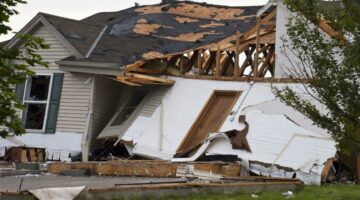Does home insurance cover snow damage?
Generally speaking, yes, home insurance will cover snow damage.
Snowy winter days can be a lot of fun for children and adults. But despite how beautiful the snow can be, Mother Nature can also be dangerous and cause serious damage to your home and belongings.
Repeated and heavy snowfall can cause snow to accumulate on the roof increasing the risk that the roof will collapse causing structural damage to the home and property damage to your personal belongings.
Most home insurance policies will cover snow damage to the structure of your home including—for example—roof collapse caused by the weight of accumulated snow or ice dams that block your gutters and cause water to leak into your attic. Damage to your personal property is likely covered as well but you may need to refer to your home insurance policy wordings for the specifics. There might be exclusions or limitations on the value of certain items.
Read: 5 Winter Home Insurance Tips Everyone Should Know
That being said, although there is coverage, many insurance providers will place the onus on homeowners to take reasonable steps to keep their roofs, gutters, and other areas clear of snow and ice accumulation. Most insurers will require you to make sure you do not accumulate more than 2 feet of snow or 2 inches of ice on the roof.
Also, if your home is not maintained to a minimum acceptable standard (ie. not waterproof or if your roof is not well maintained), insurers might chalk it up to a maintenance issue and deny your snow damage claim.
One thing to be aware of though as we struggle through winter is that flooding caused by pipes that freeze and burst are usually not covered by your home insurance policy. This type of damage is not common for owner-occupied residences because they are occupied and heated year round but cottages and vacation homes are especially vulnerable.
Read: 5 Water Damage Home Insurance Scenarios: Are You Covered?
Make sure to winterize your vacation property, drain and shut off the water, or have a trusted individual check on the home every few days to avoid this type of damage. You can negotiate this type of coverage with your insurance provider but they will still require you to take precautions to winterize the property. If you do not, your claim can be denied all the same.
Similarly, melting snow and ice is treated differently by insurers. While roof collapse due to snow load is covered, snow that melts, makes its way into your building's foundation, and then re-freezes causing fractures or other damage is not. If water from melting snow leaks into your basement causing it to flood, that may not be covered either depending on your policy.
Written by Jacques Wong

Jacques grew up around the insurance industry and began actively participating in 2013. Since then, he has gotten a Level 2 license, won Insurance Council of BC awards in 2015 and 2020 for academic excellence in the insurance licensing courses. He educates insurance professionals through PNC Learning and as a Thought Leader at ReFrame Insurance.
In his day job as an insurance broker, he helps businesses with creative risk management solutions and strategic advice when it comes to insurance.
More Q&As from our experts
- How is mortgage life insurance different than regular life insurance?
- Do hotels have insurance for their customers’ items?
- Does the way I pay for my insurance affect my premiums?
Related Terms
Related Articles

Hazard Insurance: Is Your Home Protected?

The Future of Insurtech: How Technology is Transforming the Insurance Industry
Stay informed with Insuranceopedia!
The world of insurance can be complicated. Subscribe to the Insuranceopedia newsletter and stay in the know! Access expert content, industry term definitions and answers to your questions from knowledgeable insurance insiders. Arm yourself with what you need to know to keep your assets and your family safe.


